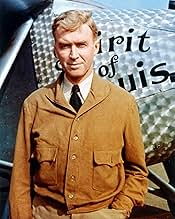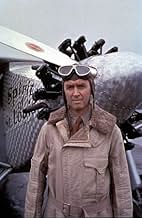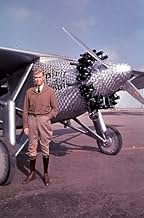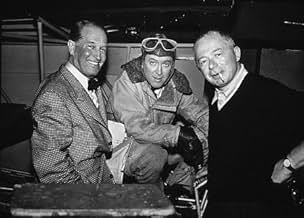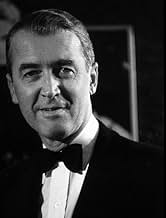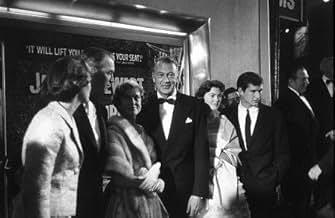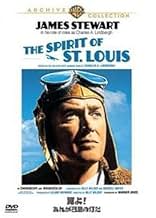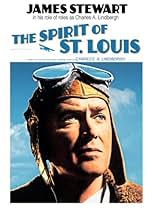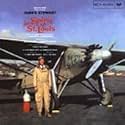Adicionar um enredo no seu idiomaCharles 'Slim' Lindbergh struggles to finance and design an airplane that will make his New York to Paris flight the first solo transatlantic crossing.Charles 'Slim' Lindbergh struggles to finance and design an airplane that will make his New York to Paris flight the first solo transatlantic crossing.Charles 'Slim' Lindbergh struggles to finance and design an airplane that will make his New York to Paris flight the first solo transatlantic crossing.
- Direção
- Roteiristas
- Artistas
- Indicado a 1 Oscar
- 2 vitórias e 1 indicação no total
- Burt
- (não creditado)
- Mother from Oklahoma
- (não creditado)
- Clerk
- (não creditado)
- Crowd Member in France
- (não creditado)
- Crowd Member in France
- (não creditado)
- Reporter
- (não creditado)
- Dad - Farmer
- (não creditado)
- Farm Boy
- (não creditado)
- Train Passenger
- (não creditado)
- Blythe
- (não creditado)
- Crowd Member in France
- (não creditado)
Avaliações em destaque
There is a good mixture of comedy and drama throughout the film and a good use of flashbacks. It also helps that James Stewart was a pilot in real life both in the military and civilian life.
James Stewart is once again an affable regular guy. It's what makes the character compelling. He isn't superhuman as much as a human with perseverance. He's older than the actual Lindburgh during the flight. The movie itself is a bit long at over two hours. It works fine until the plane takes off for the journey. The mirror is probably the best moment and the movie kind of coast from then on. The inner monologue is a good idea but it may be overused. The movie somewhat runs out of fuel but it has a gentle landing. It's nevertheless nice to see the plane.
Billy Wilder adapts from Charles A. Lindbergh's Pulitzer Prize winning novel of the same name, in what is a re-creation of Lindbergh's historical 1927 solo flight. Boosted by a considerably strong lead performance from James Stewart {himself a pilot} as Lindberg, and containing an intelligent screenplay from Wilder and Wendell Mayes, Spirit Of St. Louis is a sincerely well told story.
In what at times threatens to become a monotonous film, Wilder keeps it ticking over by using flashbacks to Lindbergh's life. After the nicely told build up to the event, such as the peril being realised as Nungesser and Coli go missing {never to be found} whilst attempting the same trip in reverse, we learn stuff like how he come to buy his first plane and his work with the flying circus. This is all relative to understanding the man and his obvious passion for flying. This also helps to give us a complete picture of Lindbergh, thus putting us with him in his isolated cockpit as he undertakes this dangerous journey. Battling isolation {his only company is a fly} and chronic tiredness, it's here where Stewart perfectly portrays Lindbergh's devotion to the task. Aided by a terrific score from Franz Waxman and Academy Award nominated effects by Louis Lichtenfield, Wilder's movie turns out to be an engaging human interest story that got a thoroughly professional production. 7/10
The film deals with little else but Lindbergh's career up to and including his monumental flight from Roosevelt Field to Le Bourget in France in 33 hours back in 1927. We see Lindbergh as a mail pilot, then attempting to raise funds to buy a plane, though a plane ended up being built by a small aircraft company. And then the flight itself - and Wilder somehow makes it suspenseful and interesting. He really captures the pilot's complete isolation with no copilot or radio, talking to himself (Stewart provides the narration), sleep-deprived, with only the sound of the plane for company, falling asleep at the wheel, and finally, unsure where he was and using map topography to figure it out. It's an amazing story. During the flight sequence, there are flashbacks to earlier points in Lindbergh's life.
The Spirit of St. Louis is replicated, and once seen, it's very hard to believe it got out of Roosevelt Field. Lightweight, Lindbergh made sure it carried only the absolute essentials and refused to even bring a parachute or radio because of the extra weight.
Today, for me anyway, James Stewart is just James Stewart, one of the great film stars and actors. I'm blissfully unaware of his age most of the time, and I was in this film as well. For me, he was tall, lanky Lindbergh, determined to succeed and very likable. I realize that John Kerr was offered the role first, but if he had taken it, the film would have flopped initially, as it did starring Stewart, due to the huge budget, but I don't believe it would hold up as well as it does today.
Heroes are very rarely discussed as human beings, and many of their words and actions are taken out of context and out of the era. Lindbergh was ahead of his time in his environmental and aeronautical pursuits and very much of his time in some of his political beliefs. And as we now know, fidelity wasn't one of his strong points. Reading an excellent, well-researched biography like Scott Berg wrote is preferable to making snap judgments. Hindsight is easy.
Complicated men have complicated lives. You don't achieve what Lindbergh did in the Spirit of St. Louis by being ordinary. Wilder does an excellent job in showing his crowning achievement, and in evoking the excitement people felt at the time.
Você sabia?
- CuriosidadesThe movie was a box office disaster when originally released in 1957, grossing less than $3 million and costing about $7 million.
- Erros de gravaçãoOn his approach to St. John's, Newfoundland in the fog, Lindbergh is depicted as being concerned about colliding with a mountain peak. However, there is no even remotely mountainous terrain anywhere in the vicinity of St. John's.
- Citações
Charles Lindbergh: Did you wait in the rain all night?
Mirror Girl: Yes.
Charles Lindbergh: Are you from New York
[City]
Mirror Girl: No.
Charles Lindbergh: Long Island?
Mirror Girl: No. I'm from Philadelphia.
Charles Lindbergh: You came all the way from Philadelphia?
Mirror Girl: I had to. You needed my mirror.
- ConexõesFeatured in America at the Movies (1976)
- Trilhas sonorasRio Rita
(uncredited)
Music by Harry Tierney
Lyrics by Joseph McCarthy
Played on a phonograph when Lindbergh is trying to rest before the flight
Principais escolhas
- How long is The Spirit of St. Louis?Fornecido pela Alexa
Detalhes
- Data de lançamento
- País de origem
- Idioma
- Também conhecido como
- The Spirit of St. Louis
- Locações de filme
- Santa Maria, Califórnia, EUA(Flight Training School)
- Empresas de produção
- Consulte mais créditos da empresa na IMDbPro
Bilheteria
- Orçamento
- US$ 6.000.000 (estimativa)
- Tempo de duração2 horas 15 minutos
- Cor
- Mixagem de som
- Proporção
- 2.35 : 1
Contribua para esta página



